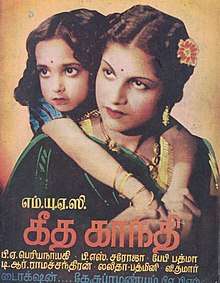Geetha Gandhi
| Geetha Gandhi | |
|---|---|
 Poster | |
| Directed by | Krishnaswami Subrahmanyam |
| Produced by | Krishnaswami Subrahmanyam |
| Written by | Krishnaswami Subrahmanyam |
| Starring |
T. R. Ramachandran B. S. Saroja V. Kumaraswami P. A. Periyanayaki |
| Music by |
C. N. Pandurangan Br Lakshmanan |
| Cinematography | B. L. Rai |
| Edited by | M. R. S. Mani |
Production company |
Madras United Artistes Corporation |
Release date |
|
Running time | 208 mins. (19500 ft.) |
| Country | India |
| Language | Tamil |
Geetha Gandhi (Bhagavad Gita and Gandhi) is a 1949 Indian, Tamil-language film produced and directed by Krishnaswami Subrahmanyam.[2] The film featured T. R. Ramachandran and B. S. Saroja in the lead roles.
Plot
Subbaiyer is an old man whose granddaughter is studying in Annamalai University. She comes home by train. At Egmore railway station an unknown woman hands over an infant child asking the girl to hold it for a moment. While the girl is holding the baby, its mother jumps in front of a train and commits suicide. Shocked by this, the girl approaches the police. But they taunt her. She goes home with the baby and there also she is treated in the same manner. In the meantime, two men travel in a train. One is a doctor and the other is a person who is intent on carrying out a revenge. The latter takes the identity of the doctor and sends the real doctor to a mental asylum. The fake doctor "invents" a medicine and becomes rich. A nurse falls in love with him. The girl who was chased out of the house enters the mental asylum after the abandoned baby dies. The old man, Subbaiyer, is saddened by the turn of events and takes it upon himself to bring back happiness in the family. What he does, forms the rest of the story.[3]
Cast
The list is compiled from the database of Film News Anandan[1] and from the review article in the Hindu newspaper.[3]
- T. R. Ramachandran
- B. S. Saroja
- P. A. Periyanayaki
- Baby Padma
- M. R. S. Mani
- V. Kumaraswami
- K. S. Angamuthu
- Pandit Bholonath Sharma
- K. Viswanathan
- R. Padma
- Lakshmiprabha
- Vinayaga Mudaliar
- Dance
Production
Krishnaswami Subrahmanyam produced the film under the his own banner Madras United Artistes Corporation. As a follower of Mahatma Gandhi, Subrahmanyam made films like Sevasadanam, Thyagabhoomi and Balayogini with social themes relevant to Gandhian principles. This is another on the same lines.[3]
Subrahmanyam's daughter, who was known as Baby Padma featured in this film as a child artiste. There was a dance sequence by lalitha and Padmini, a dance drama. Saroja and Pandit Bholonath Sharma performed a fine dance as well.[3] Choreography was by Bholonath and Katak Muthuswami.[1]
Soundtrack
Music was composed by C. N. Pandurangan and Brother Lakshmanan while the lyrics were penned by Meenakshi Subrahmanyam. Padma sang two songs in the film. One song was in praise of Mahatma Gandhi and the other was about her ambition in life. There was a line in the lyrics that said she will become a dancer and stage her dance in America. It is significant because in later years she became a world renowned Bharatanatyam dancer.[3]
Reception
In spite of good story-line and pleasing music, the film did not do well at the box office. However, the film is remembered for B. S. Saroja's performance and the featuring of Baby Padma.[3]
References
- 1 2 3 Film News Anandan (23 October 2004). Sadhanaigal Padaitha Thamizh Thiraipada Varalaru [History of Landmark Tamil Films] (in Tamil). Chennai: Sivakami Publishers. Archived from the original on 29 May 2017.
- ↑ Ashish Rajadhyaksha & Paul Willemen. Encyclopedia of Indian Cinema (PDF). Oxford University Press, New Delhi, 1998. p. 595.
- 1 2 3 4 5 6 Guy, Randor (7 August 2009). "Geetha Gandhi 1949". The Hindu. Archived from the original on 29 May 2017. Retrieved 29 May 2017.